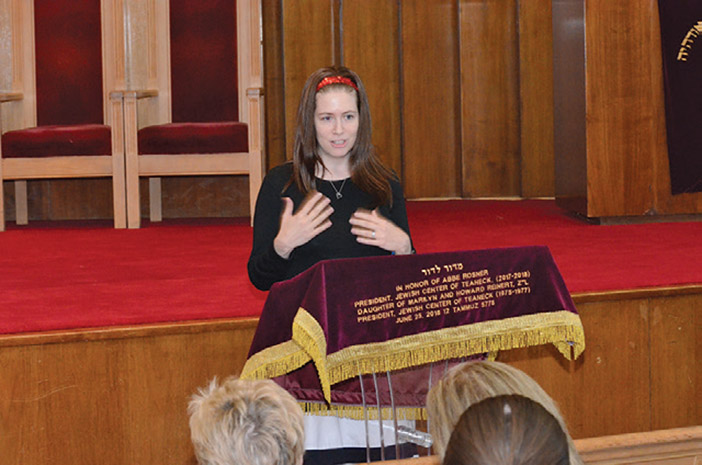

The Nine Days is a time for Jews to not only address communal suffering, but to aim to rectify breaches in achdut by reaching out to others around them, especially in the area of mental health. On Sunday evening, July 15, community members, mental health professionals and friends gathered at the Jewish Center of Teaneck to listen as two women opened up a forum for discussion about mental health during and following pregnancy.
“This is a time to look at our own lack of community sensitivity in order to bring people together,” said Rabbi Daniel Fridman, rabbi of The Jewish Center of Teaneck, as he addressed the audience before the evening’s event. “These efforts require more than just good intentions. It requires knowledge of the challenges individuals or families face. Only by raising awareness can we break the stigma.”
Marilyn Laves, a licensed clinical social worker with over 20 years of experience, introduced Arona Berow, a social worker who experienced postpartum depression following the birth of her daughter. Berow shared her honest and emotional experience with anxiety and postpartum depression.
“Postpartum anxiety or mood disorders affect one in nine women, which means it is more common than we think,” said Laves. “Chances are, someone we know has dealt with it, whether we realize or not.”
“Postpartum depression does not discriminate,” said Berow as she described her transition from a lively mom-to-be who looked forward to every aspect of motherhood, to someone socially withdrawn, eventually resenting her child and husband. “I would go to shul and I wouldn’t want to go home,” recounted Berow. “I thought of 100 other places I would rather be instead of home with my baby.” She described how every aspect of life with a new baby intimidated her, from how to plan outings to figuring out nap schedules. She was exhausted from not sleeping, but was afraid to sleep because of the fear of missing the baby’s cry. She watched the clock and came to view each evening as having “survived another day with the literal ball and chain” of the prison in which she now felt she existed.
When Berow was still crying daily, even weeks after her daughter’s birth, her mother encouraged her to get help. Berow did not yet realize the extent of her anxiety and depression, until one night in bed, when she thought of all the sharp knives in her kitchen and what she could do. “But then,” she tearfully told everyone, “I thought of my daughter, and how she needed her mommy, and needed to grow up with her mommy. My daughter saved my life.” For days, Berow was scared to even go into her kitchen. Even then, it was a long process until she finally sought professional help, and admitted to another person that she had entertained thoughts of self harm.
Together with her husband, therapist and a supportive network of family, friends and community, what once seemed burdensome is now a source of enjoyment. “I love my daughter more than anything else in the world,” she said at the beginning of the evening, “but that wasn’t always the case.”
Laves explained that there are certain risk factors for postpartum and perinatal mood disorders of which people should be aware. “This does not mean that someone will definitely have depression, it is just important to know so that doctors and family, as well as the mother herself, can keep an eye out and be aware,” said Laves. Laves also discussed the difference between baby blues, which is common and present in 60-80 percent of new moms, but typically ends by the two-week mark, and more severe forms of postpartum mood disorder such as anxiety or depression.
Laves encouraged family and friends to be aware, for themselves and others, of some of the risk factors for postpartum mood disorders, which include:
“These risk factors are important because a new pregnancy can be a trigger,” said Laves. “Being aware is also especially important for the partner or spouse as well since they are part of the support in place and are an extra set of eyes.”
As a social worker herself, Berow is passionate about destigmatizing mental health needs and seeks to help communities create a safe space for people to speak openly about their feelings, and also assist these communities in knowing how to respond. “No one is embarrassed to get the flu,” she said. “We’ve normalized carrying an EpiPen and halachic prenups. If someone breaks their arm, they go to the doctor to fix it. We need to normalize mental health issues so people can get the help they need.”
Many people in the audience took the opportunity to ask questions, and both Laves and Berow were happy to respond.
There are many resources locally to help someone with questions or concerns. To find support groups in a specific area, go to http://www.postpartum.net/locations. To reach out to the Jewish Family and Children’s Services of Northern New Jersey, visit www.jfcsnnj.org.
For information or a confidential consultation with Marilyn Laves, email mlaveslcsw@gmail.com or go to the website, https://wmhcny.org/profile/marilynlaves.
By Jenny Gans












